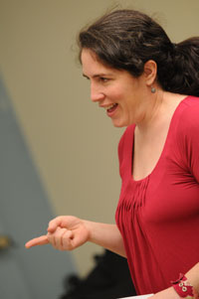"I love language because it's a window into culture. I think here at Berklee in particular, it's a way to provide students with a bridge to fellow students. It gives them an opportunity to engage in a whole other social experience. I really feel lucky that I can help them develop that skill."
"My teaching style is always evolving because I'm always learning, both about the subject and also about pedagogy and methodology. I used to do a mix of English and Spanish in my classes, but now I teach almost exclusively in Spanish. My philosophy is about immersion in the language. Because the students don't have the benefit of being surrounded by Spanish in the larger culture, those three hours of dedicated Spanish each week are key to their growth as language learners."
"Sometimes, students can feel overwhelmed and vulnerable during the process. When we can't express ourselves in a sophisticated way, we feel silly and inept. I think we tend to get more reserved when we're feeling anxious. But if you give yourself over to the experience and forget about being cool, you can have a lot of fun. You have to be goofy, because you're learning a language. Let's just celebrate that."
"I also incorporate music into my Spanish classes. Each student brings in music twice per semester and talks about the music and the artist. My intermediate students write a music review in Spanish; and I use a lot of musical examples in grammar lessons. I try to present music as an aspect of culture, because there is so much Latin music. The music in Cuba is very different from the music in Argentina, which is very different from the music in Colombia. Students get to truly understand the diversity of the Spanish-speaking world through the lens of music."
"When I teach writing, I try to teach it as a craft and explain to students that it's an art, just like music. It may not be your chosen art, but we can we learn about music by studying writing."

